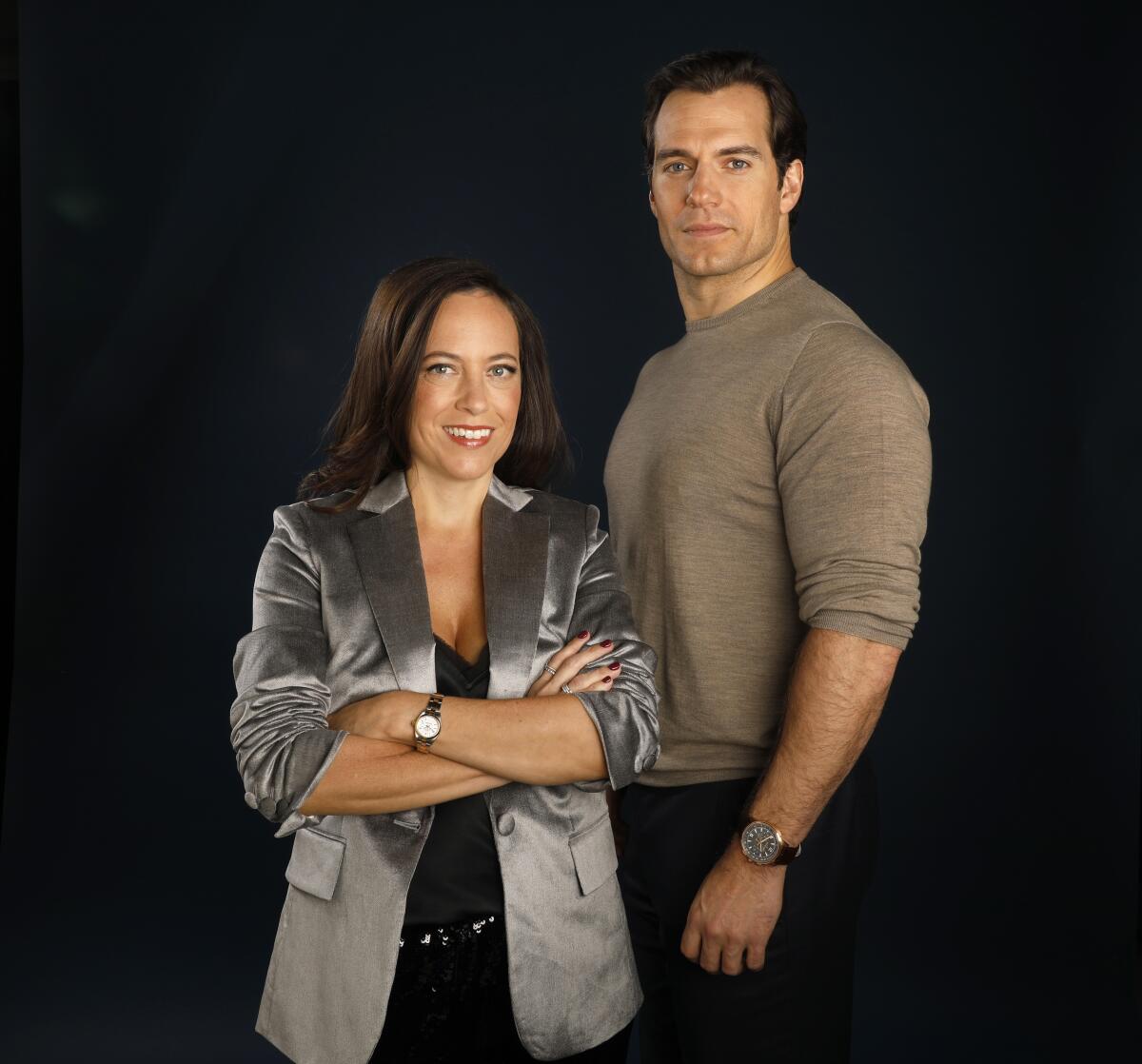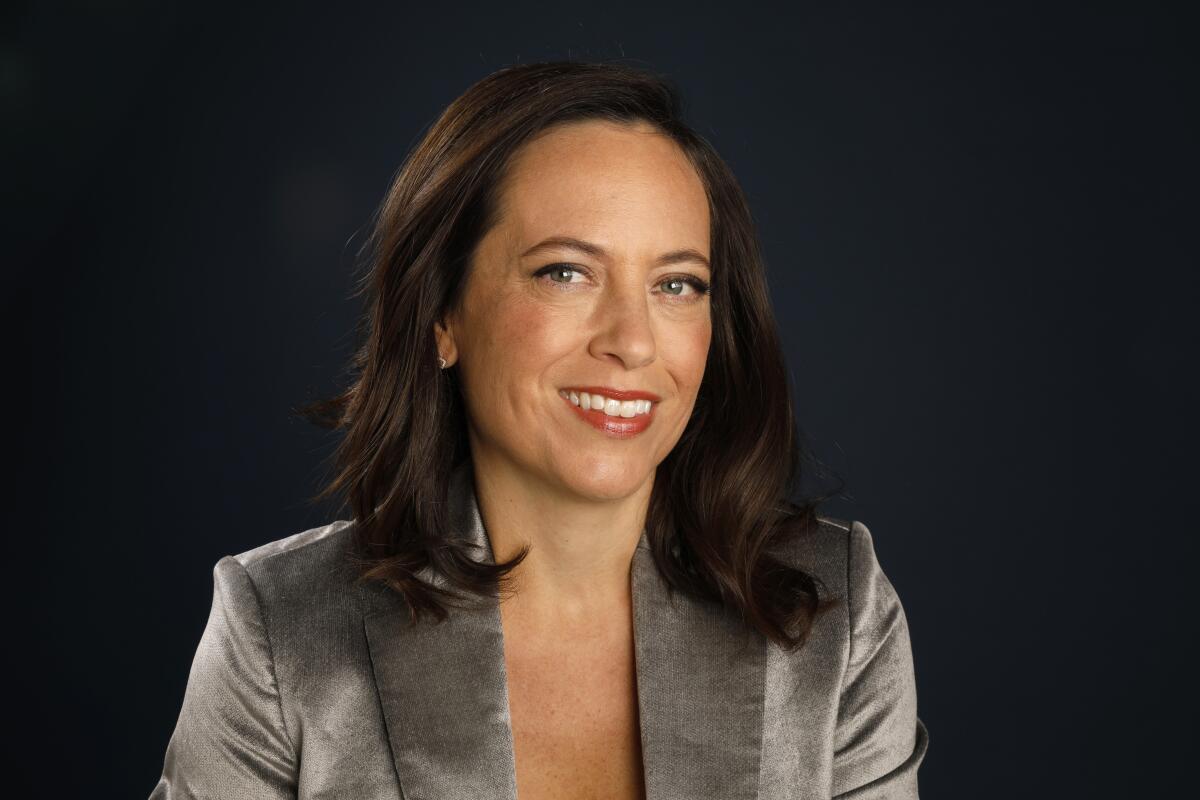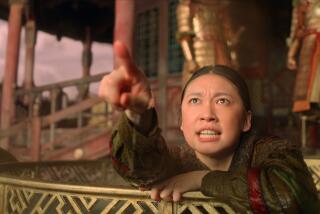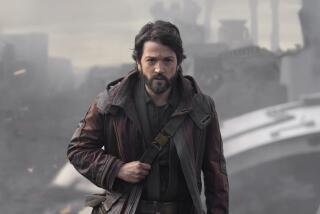Meet the unlikely pair behind Netflix’s crack at the next ‘Game of Thrones’

Lauren Schmidt Hissrich and Henry Cavill are a study in contrasts.
She is diminutive, he imposing. She speaks at a swift clip, punctuating her sentences with hand gestures; he is more deliberate, less demonstrative. She sports glittering, purplish pants. He quips that he wears his glitter pants “on the inside.”
As becomes clear during the course of the conversation, though — as much a dialogue between Hissrich and Cavill as it is an interview — the showrunner and star of Netflix’s new fantasy drama “The Witcher,” which premieres Friday, are uncommonly well paired. For one, both are wunderkinds of a sort.
Hissrich, now 41, started her career at 20, answering phones on “The West Wing” before being promoted to writer over its seven-season run. Cavill, 36, landed his first major role at 17 in 2001, donned Superman’s cape in 2011 and last year appeared in the blockbuster “Mission: Impossible” franchise.
The two even manage to divide and conquer my questions: At one point, asked about the relative dearth of women at the helm of such properties, Hissrich offers her thoughts on Hollywood’s role in the problem before handing off the response to Cavill, who tackles the genre’s.
In other words, if she is thesis, he is antithesis — and their synthesis is crucial to the TV series that may one day be seen as Netflix’s “Game of Thrones.”
HBO’s game-changing epic, which concluded earlier this year, has been the point of comparison in the press since Netflix unveiled the first teaser trailer for “The Witcher” to Comic-Con’s Hall H in July. And it’s one that Kelly Luegenbiehl, the streamer’s vice president of international originals, disputes: “I am a big fan of ‘Game of Thrones,’ but the fantasy genre is big enough for more than one show,” Luegenbiehl wrote in an email to The Times.
That may be true, but the series premiere of “The Witcher” alone features enough images reminiscent of “Thrones” — a clash of armies on a barren hillside; nude women picking fruit in a courtyard; and most especially a suicidal step from a high window — that it practically invites one to draw the parallel.
“There are obviously fantasy tropes that we’re not going to avoid just because another show has done them,” Hissrich says of the more specific correspondences. The series also has similar potential to attract a worldwide audience, and as such has been dubbed in all of the platform’s available languages, per Lugenbiehl.
Whatever kinship “The Witcher” shares (or doesn’t) with “Thrones,” Hissrich acknowledges the large footprint of TV’s most talked-about genre entry in memory. In fact, she welcomes it.
“I hope that’s our show,” Hissrich says, citing “Thrones’” viewership, awards haul and eight-season run. “They brought fantasy to the masses. Two years ago I said, ‘ I’m not a fantasy writer.’ I’m not sure I’d have said, ‘I’m a fantasy viewer.’ Now I know I am, because I sat and watched ‘Game of Thrones’ and have never been more invested in a show in my life.”

Both she and Cavill emphasize that “The Witcher,” based on the popular series of novels and stories by Polish author Andrzej Sapkowski, features more “magic and monsters” than “Thrones.”
“‘Game of Thrones,’ aside from the dragon piece, is a very real-world type environment,” says Cavill, a lifelong fantasy reader who remembers the genre as his first shared hobby with his father. “There are stories of things that are otherworldly, and you have the White Walkers and everything, but the majority of the storytelling is around politics.”
Hissrich, whose previous credits include Netflix’s Marvel series “Daredevil” and “The Defenders,” as well as “The Umbrella Academy,” had already read the first “Witcher” book, “The Last Wish,” when Netflix gauged her interest in the project. She almost turned it down.
“I actually said that I didn’t know that I was the best person, because I’m a fan of fantasy but it’s not what I live and breathe,” Hissrich says. “The people who I was working with at Netflix basically said, ‘How would you tell the story? If you were going to do it, how would you do it?’”
Her version follows Cavill’s Geralt of Rivia — a transient sword-for-hire with the occult know-how to fight a range of supernatural forces — and the two fellow “orphans” introduced later in Sapkowski’s telling, with whom he’ll form a makeshift family: Ciri (Freya Allan), a princess in exile from her sacked city, and Yennefer (Anya Chalotra), an abused sorceress just learning the extent of her powers.
Hissrich says that her previous experience on Netflix series taught her how to write for “the binge model,” which limits the amount of time one needs to spend recapping plot points. It’s a luxury for an eight-episode arc that must introduce “The Witcher” universe, dispatch multiple monsters and juggle a trio of protagonists.
“We don’t do a ‘previously on’ for our episodes, nor do I coddle audiences into understanding everything that’s come,” Hissrich says.
Meanwhile, Cavill came to “The Witcher” by way of the video game franchise spawned by Sapkowski’s stories. Cavill is such a committed fan that he describes “pushing, pushing, pushing” his agents to land him the role — and even offered to grow out his own hair and dye it white to play the disarmingly locked Geralt, at least until he and Hissrich learned that such treatment would cause it to fall out.
But for all the games’ success, with “The Witcher 3” alone having sold more than 20 million copies, Netflix has kept them at arm’s length. Hissrich has previously said that the games’ story lines won’t be adapted for the TV show. And Luegenbiehl, when asked whether the popularity of the games was a factor in Netflix’s decision to move forward with “The Witcher,” wrote only, “Do I hope that fans of the games come to the series and find something they love too? Of course.”
Since the 2014 emergence of “Gamergate” — a movement of internet trolls who targeted critics of racism, sexism and homophobia in gaming — aspects of gaming’s online subculture have developed a toxic reputation, posing a dilemma for brands. As Cavill notes, the association between misogyny and the fantasy genre stems not from literature but from message boards and websites associated with video games.
“The gaming community is a very, very active community. They are very vocal, and they are not necessarily very pleasant to each other. If you go on any popular game forums, there can be a lot of less-than-positive things said on there,” he says. “The majority of gamers, their only connection to each other is the internet, and as we all know, there are very few white knights on the internet, and those that are white knights are shouted down or disappear.”

With “The Witcher,” Hissrich joins the short list of female showrunners at the helm of fantasy dramas, including Sera Gamble (“The Magicians,” “Supernatural”) and Julie Plec (“The Vampire Diaries,” “The Originals,” “Legacies”). But Hissrich says her responsibility is to “make all of the characters, male or female, as layered and dimensional as possible,” not to confront the genre’s, or Hollywood’s, tradition of slighting women. She cautions that the solution isn’t simply to elevate women into positions of leadership but to offer them more opportunities at the start of their careers.
“The truth is, 20 years ago we needed to be giving young women more opportunities. That’s the only way you get me in my position now,” she says. “What you don’t want is just to say, ‘All showrunners need to be half women and half men,’ because then, for men and women, you could get inexperienced people doing those jobs, failing, and then not getting the opportunity to do them again.”
Both Hissrich and Cavill contend that kindness is more important to ensuring a positive work environment. Perhaps it’s by sharing this underlying philosophy that the pair, for all their contrasts, seem to have collaborated so successfully — through long stretches away from their families and hour upon hour on set, often shooting through the night in the snow. That’s not to say Superman or his showrunner are pushovers, though.
“Nice doesn’t mean ‘naive.’ Nice doesn’t mean ‘gullible,’” Hissrich says. “In my job, one of the most important things to be is decisive and firm. We don’t have a lot of time to debate things endlessly.”
‘The Witcher’
Where: Netflix
When: Any time, starting Friday
Rating: Not Rated
More to Read
The complete guide to home viewing
Get Screen Gab for everything about the TV shows and streaming movies everyone’s talking about.
You may occasionally receive promotional content from the Los Angeles Times.







